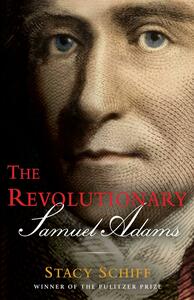You need to sign in or sign up before continuing.
Take a photo of a barcode or cover
informative
medium-paced
This was an interesting book but difficult to get through. It's dense and I often felt like I was reading a textbook.
adventurous
informative
tense
fast-paced
Moderate: Gun violence, Violence, Murder, War
Minor: Racism, Slavery, Religious bigotry
Sam Adams is a fascinating character and Stacy Schiff is a fantastic writer. This one required a lot of mental fortitude and a dictionary, but definitely worth the read. I read this one as a part of Sharon McMahon's book club. Favourite quote: "A friend might be greeted with: 'You are an incendiary, and I hope to see you hanged yet in your shoes.'"
Not the most interesting book. However, I did learn a lot about a historical figure I knew almost nothing about.
Before reading this book, I knew exactly two things about Samuel Adams: 1) he signed the Declaration of Independence and 2) his cousin is John Adams.
Reading this book really helped solidify my understanding of this time period. For instance, I had no clue the war (Lexington and Concord specifically) actually predated July 1776.
At times, Samuel Adams seemed to disappear in his own biography as others took to the stage. At other times, I got the cast of characters confused. Little was shared about his early life and even less about his family. However, this biography could easily be a biography of the revolution itself. The entire course of events seemed to be orchestrated by Samuel himself. And, without Samuel, it seems (to me at least) that there would be no President John Adams.
I really loved learning about this forgotten Founding Father (though it still feels like too little about him was actually shared).
Reading this book really helped solidify my understanding of this time period. For instance, I had no clue the war (Lexington and Concord specifically) actually predated July 1776.
At times, Samuel Adams seemed to disappear in his own biography as others took to the stage. At other times, I got the cast of characters confused. Little was shared about his early life and even less about his family. However, this biography could easily be a biography of the revolution itself. The entire course of events seemed to be orchestrated by Samuel himself. And, without Samuel, it seems (to me at least) that there would be no President John Adams.
I really loved learning about this forgotten Founding Father (though it still feels like too little about him was actually shared).
I listened to this one and I did not always follow it easily- I am sure that is on me though and not the book. I did enjoy learning more about Samuel Adams and his influence
DNF 65%. Was so disjointed and repetitive that the actual story was hard to find. Also had way too much repeating background history that easily became not Samuel Adams specific.
I wanted to like this book so much more than I did. There’s no doubt it is amazingly researched with so much more info to share about Boston’s lead up to the Revolution than I knew even existed. Because Sam Adams has no remaining diaries, letters etc, it’s not as much a biography of him as a history of this ~15 year period before the Revolution. I thought the narration was quite flat and too hung up on boring minutiae to keep me engaged despite my love of all of the topics covered. Such a missed opportunity for a little more humor and caricature.
Another great biography from Schiff. It focuses primarily on the period from 1765-1775 and gives one a close up view of history and the central role Samuel Adams played in the run-up to the war. He was the chief propagandist for the colonists and irked the British to no ends such that they saw him as the instigator despite hiding behind numerous pseudonyms. His relationships with Hancock, John Adams and others are elucidated. A fascinating read. I learned a lot about important events in American history. She makes history come alive.



